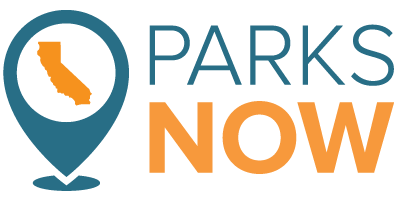Passage of AB 1680 "is a huge win. Forty years after the Coastal Act, we can finally say ALL beaches in California will be open to all Californians.” — Marce Gutiérrez-Graudiņš
When she first started advocating for coastal access and ocean conservation in Sacramento, Marce Gutiérrez-Graudiņš was often the only Latina in the room. “I used to run around the Capitol trying to meet as many office members as I could, sometimes attending 25 meetings in a day,” remarks Marce.
Marce knew this lack of representation at the Capitol was far from reflecting the enthusiasm and care her community felt for California’s ocean and coastal beaches. So the following year, she invited a few Latinx friends and partners to join her at Sacramento on Ocean’s Day. “It was really about changing the narrative of who’s seen as an oceans advocate,” says Marce. “We are ‘ocean people,’ too-- the Latinxs Marinos.” Immediately, Marce felt a shift. “It made such a difference to carve out our own space and set our own terms,” she says. Since that day in 2015, Latinxs Marinos has grown year after year. This past Ocean's Day, nearly 90 Latinxs Marinos traveled from across the state and gathered in Sacramento to voice their support for the California coast.
Building trust and relationships take time, but it’s absolutely essential to Azul’s work. “Because of the support we’ve built over the years, from campaigns like Latinxs Marinos and others, we’re driven to be bolder and more assertive.” One clear example is Azul’s campaign to reduce plastic pollution in California, which led to a statewide ban of single-use bags.
Marce is also clear that Azul’s work is not necessarily about empowering Latinx voices, but rather showcasing the leadership on environmental and conservation issues that already exist within the Latinx community. “We're not convincing people to respect the environment, because Latinx folks have done that for generations,” says Marce. “The most important thing we can do is organize opportunities for people to participate-- to show up at a hearing, write letters, or speak in a video. We let folks know what those opportunities are, when they are and how to take advantage of them.”
Thanks in large part to Marce and Azul’s efforts, California is celebrating the recent passage of AB 1680. “Forty years after the Coastal Act, we can finally say ALL beaches in California will be open to all Californians,” says Marce. “When we pass bills like AB 1680 and meaningfully support youth access programs, we’re not just sending a strong message that everyone has a right to enjoy the outdoors. We’re going a step further to make sure these places are actually welcoming and accessible for all.”
To learn more about Marce and the work Azul is doing to engage the Latinx community in protecting coastal resources and marine life, visit http://azul.org/en/

